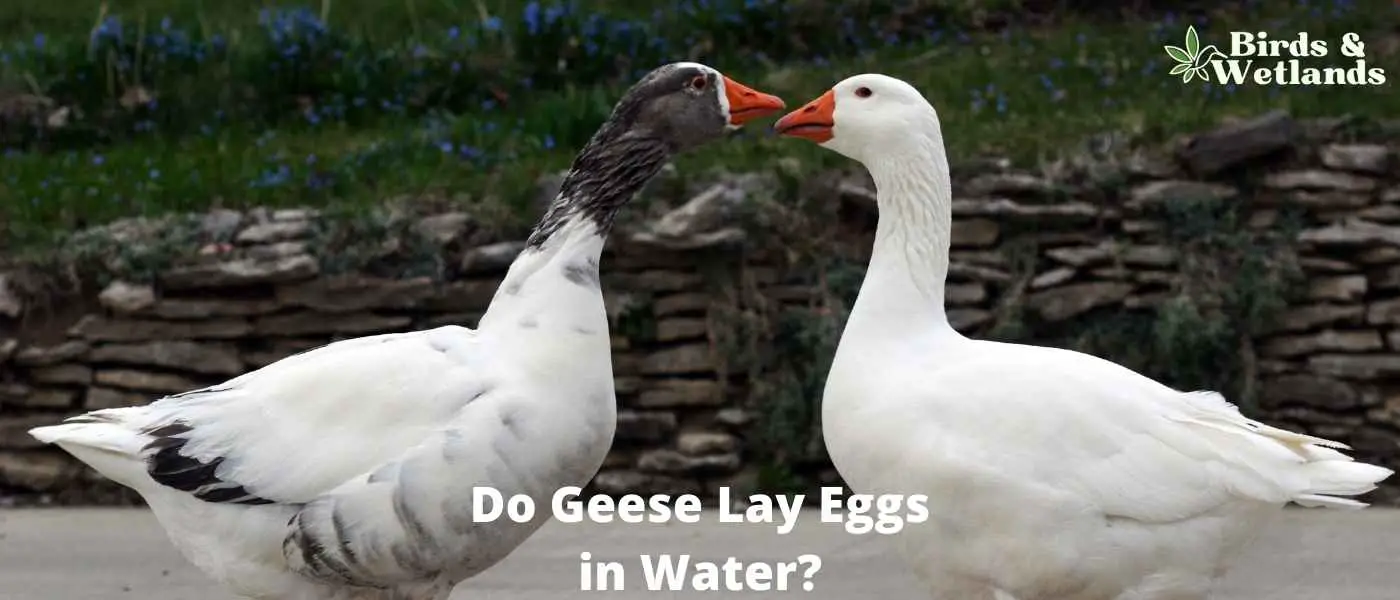Geese live near bodies of water such as ponds and lakes. So it is understandable that many people wonder if they lay eggs in the water.
Geese do not lay their eggs in water. They will build a nest on land, near water, and incubate their eggs there. The female will stay on the nest to keep the eggs warm while the male keeps watching nearby. Once the goslings hatch, they head to the water with their parents.
Why Don’t Geese Lay Eggs in Water?
Canada Geese typically build their nests on land, near water in preparation for the breeding season. They usually hide in the bushes to keep their eggs safe and young birds to develop.
If they built their nests in the water, the eggs would be more likely to float away or be eaten by predators. Additionally, the young Canada geese would have a more challenging time getting out of the water and could drown.
Canada Geese avoid the eggs in their nesting sites from becoming damp, which can cause them to rot. If the eggs were laid in the water, they would become soaked and decay.
By laying the eggs on land, the Canada geese can ensure that their eggs will hatch and that the babies will be healthy.
So, while Canada geese may spend a lot of time in the water, they don’t lay their eggs there.
These waterfowl build their nests on dry land, particularly near bodies of water, where they have a vantage point for spotting approaching predators and provide easy access to water where they can escape. This is for the safety of their young and to increase the success of hatching.
Do Geese Lay Unfertilized Eggs?
In farming, domesticated geese are bred for egg production in a similar manner as modern chickens.
Most birds including ducks need a mate to lay eggs, but geese are different. Geese, hens and ducks can lay eggs without a mate, which are not fertilized.
These eggs will not hatch into baby geese or goslings. However, if a goose has a mate, the eggs she lays will be fertilized and become chicks.

Are Goose Eggs Larger Than Chicken Eggs?
Yes, goose eggs are much larger than chicken eggs. On average, they are about three times the size. This is because geese are much larger birds than chickens. Therefore, their eggs are also larger.

How Many Eggs Does a Canada Goose Lay?
Geese don’t lay eggs all year round. When a Canada goose reaches her breeding age, she typically lays between 2 to 9 eggs in the early spring or after they have made their annual migration back to their nesting sites.
The number of eggs in a clutch can vary based on the breed, age and health of the goose, as well as the time of year. Generally, as the geese get older, they lay fewer eggs that are low in quality.
A female lays one egg every 24 to 48 hours. Once the clutch is complete, the mother goose begins to become broody and start the incubation period.
During this time, the male goose will stand nearby, watching out for potential predators.
Do All Canada Geese Eggs Hatch at the Same Time?
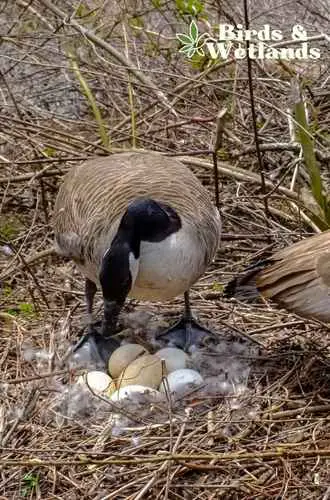
Yes, all Canada goose eggs hatch at the same time. The female goose will incubate the eggs for about 28 to 30 days. The goslings will leave the nest within a day or two of hatching.
If the nest of a goose couple gets destroyed before their eggs start to hatch or earlier in the nesting season, the pair will generally begin building another nest at or very near the original nesting site.
Wild geese are very territorial and often return to the same nesting spot yearly. The pair may give up and move to a different area if the new nest is destroyed.
Geese mate for life, so it’s very important to them to find a safe place to raise their young. If one pair dies, the other pair will eventually find another bird to mate.
Where Do Geese Lay Eggs?
Geese typically lay their eggs in a nest built on the ground. The nest is usually made of grass and other vegetation and can be quite large, sometimes holding up to a dozen eggs.
Geese will often return to the same nesting spot year after year.
If you find a goose nest on your property, it’s best to leave it alone. Disturbing a nest is one of the reasons Canada geese abandon their eggs, leaving the goose eggs vulnerable to predators or the elements.
Not to mention illegal.
If you need to relocate the nest with the goose eggs in it, you need to contact wildlife services for assistance.
Do Geese Sit on Eggs All Day?
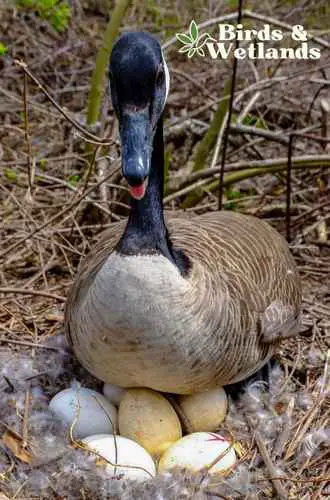
After the breeding season or mating season, female geese incubate their eggs by sitting on them all day. They keep the eggs warm and protected from predators.
It is not uncommon to see female geese leave their eggs to eat and drink. But they will return to resume incubating the eggs.
Geese typically lay their eggs in the morning, so it is natural for the females to take a break in the afternoon to tend to their own needs. The males will usually remain with the eggs during this time.
The eggs will hatch after about 28 to 30 days. The male and female will protect their young, with the mother keeping them warm with her wings. The goslings will then follow their mother around, learn how to find food, and stay safe.
The female goose will continue to care for her young until they are old enough to fend for themselves. This increase the survival rate of goslings compared to other bird species.
After that, the geese will typically live in flocks with other geese. They will migrate together to different areas depending on the season.
The Bottom Line on Do Geese Lay Eggs in the Water
So, do geese lay eggs in the water? No, you won’t be witnessing geese laying eggs in the water. The reason for this is that the nests geese build are on land, not in the water.
This is a good example of how animals have adapted to their environment over time to increase their chances of survival.
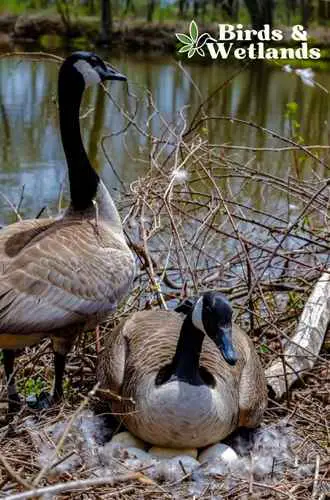
FAQs on Goose Egg
Can You Eat a Goose Egg?
Goose eggs are safe to eat, though most people find their flavor stronger than hen or duck eggs.
A goose egg is a good source of protein and can be eaten boiled, fried, or scrambled.
Some people don’t eat goose eggs because they find them too strong in flavor, but they are otherwise a healthy and safe option for breakfast, lunch, or dinner.
Can a Goose Egg Carry Salmonella?
Yes, goose eggs can carry salmonella bacteria. In fact, any type of poultry egg can harbor salmonella.
The best way to prevent illness from eggs is to cook them thoroughly. Raw or undercooked eggs should be avoided, especially if they are not from a trusted source.
Does a Goose Egg Have a Protective Film?
Yes, when geese lay their eggs in the spring, they are laid with a protective film on the shell that helps to protect them from absorbing any bad bacteria that could harm the unborn gosling.
This film is made up of various proteins and fats which help to keep the egg safe and clean. Without this film, goose eggs would be much more susceptible to infection and disease.
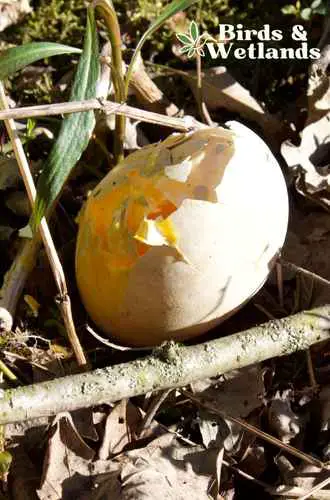
Can You Touch a Goose Egg?
No, you shouldn’t touch a goose egg. It’s important to leave the nest completely alone. Don’t touch the eggs, nest, or surrounding area.
Doing so could harm the eggs or the developing goslings inside.

